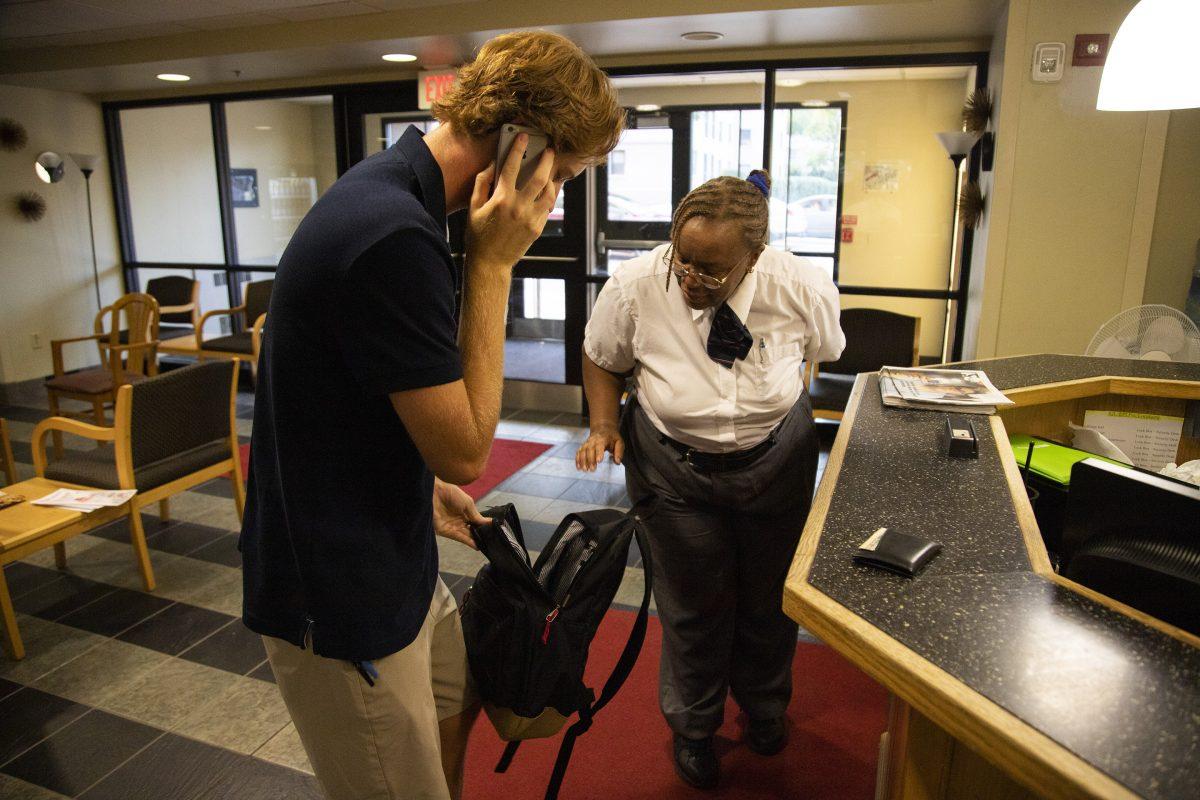While random bag checks are a regular part of safety protocol in residence halls, many returning residents have noticed an increase in checks this semester.
A number of desk attendants interviewed by The Hawk confirmed they have been encouraged to check more bags this semester and to follow more closely the procedure in place.
One desk attendant, who requested that her name not be used for fear of losing her job, said she thinks the directive is linked to safety.
“I think it’s just to ensure the safety because so many things have been happening all over campuses that they are encouraging security in every school to do more bag checks, to do more walking, to do more everything,” the attendant said. “It’s just basically to ensure the safety of everyone.”
According to the University’s Student Handbook, desk staff have the right to inspect bags and deny entrance to a building if a resident or guest refuses.
“We have a program that enlists a random bag check procedure that changes each month,” explained Arthur Grover, director of Public Safety & Security, “and that bag check procedure that changes each month instructs the desk attendant to check every fifth, seventh, eighth, ninth, student, so it becomes routinized, not singling anyone out.”
Grover added this system of checking bags helps to deter bias. Grover said the 90 desk attendants that the university employs are contracted out through Allied Universal, a security company, which is responsible for making sure the policies are enforced. Their supervisor is William Kovar, who said through Grover that the current bag check policy has been in place for about 10 years.
When bag checks are executed, desk attendants are searching for items that are not allowed in the residence halls, Grover said.
“Alcoholic beverages, narcotics, drugs, weapons, things that you wouldn’t want in your living space, and I wouldn’t want in my living space,” Grover said. “And I’m sure the parents of our students wouldn’t want that either. So, that’s what we seek to do.”
Grover said the number one contraband item confiscated in bag checks is alcohol.
“I was a young person, too,” Grover said. “I understand that. We have our rules and regulations. A lot of that is confiscated. We have a procedure at Public Safety headquarters. We put it on a property receipt, we dispose of it, destroy it, pour it down, with a witness, down the drain.”
Jessica Moran-Buckridge, director of Residence Life, said in an email there is no “one-size-fits-all” penalty for students who are caught attempting to bring in a prohibited item.
“Typically, if a desk attendant becomes aware of a policy violation found during a bag check (or any other time as well), they would work with Public Safety to make an incident report,” Moran-Buckridge said. “Incident reports involving residential students are shared with Residence Life and are referred to Community Standards for any needed follow up.”
Moran-Buckridge said she does not have data “readily available” regarding how many bag check violations occur every semester.
Moran-Buckridge reiterated that, per university policy, everyone who lives in a residence hall, and any of their guests, are subject to bag checks. But not all residents have noticed an increase in checks, and not all desk attendants whom The Hawk interviewed knew what the policy was regarding the rotating number of bag checks.
Many residents in Merion Gardens, a residence hall that houses sophomores, juniors and seniors, said they rarely see bag checks.
“I haven’t seen bag checks here,” said Amber Weedon ’22, a resident of Merion Gardens. “Last year I lived in Sourin and got bag checked a lot. This year I’ve never been bag checked. I heard about a lot of bag checks in Lannon, but never here.”
When asked about the frequency of bag checks in residence halls this semester, Moran-Buckridge said that while Public Safety and Residence Life are “partners” in enforcing the bag check policy, Residence Life does not oversee the desk attendants in this regard.
“Though we in Residence Life work very collaboratively with the desk attendants, we do not supervise them directly,” Moran-Buckridge aid. “Everyday supervision and procedure directives come from their supervision line.”
That line leads to Grover, who said enforcement is key to a safe living environment.
“To me, that is important space to protect, if not the most important space to protect on our campus,” Grover said. “Why is that? Because that’s where our resident students, live, study, sleep and reside.”















































